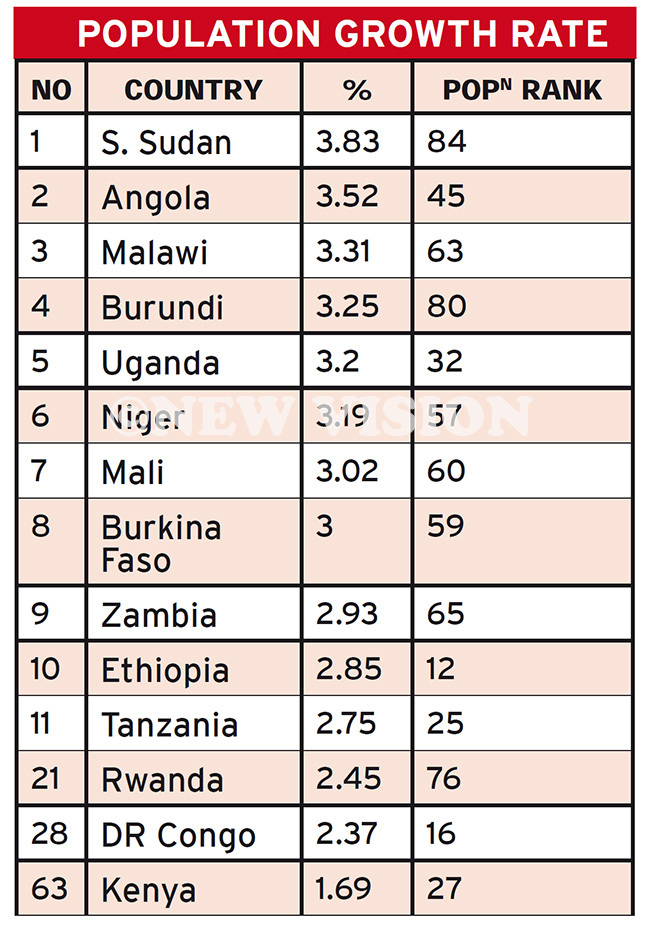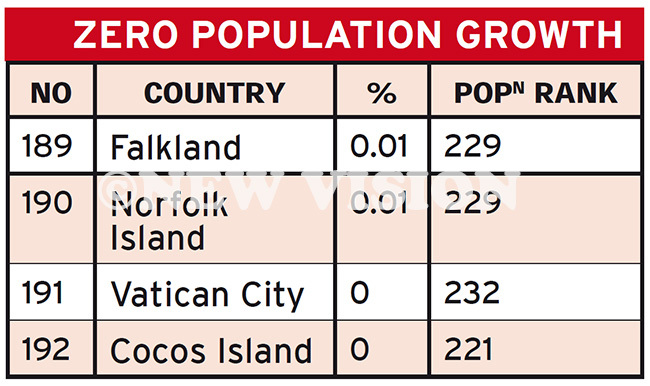How Uganda fared in world ranking
Dec 31, 2019
Uganda is the largest refugee hosting country in Africa, with refugees from mostly South Sudan, DR Congo, Burundi and Somalia.

YEAR ENDER
Year enders are a stock-taking time for individuals and nations. Thus, the end of 2019 comes with statisticians evaluating performance. Hilary Bainemigisha looks at two scenarios where Uganda stormed into world rankings, one for bad and another for good reasons
The net is awash with top tens of almost everything; economic performance, living conditions, sports performance, and military might. Some have declined, others improved.
For Uganda, the chance of storming the top ten ranks in the world comes on a bad note with population growth rate ranking fifth in the world.
Population growth would not be a problem if it was matched with economic development.
However, on a good note, Uganda was ranked fourth in the world among refugee-hosting countries. It gets better when only Africa is considered.
There, Uganda ranks first.
Population growth
Three days to go and by midnight of December 31, Uganda will be getting its 44,267,594th human being born in 2019. It will most likely be male, born to a teenager, in a hospital in an urban setting.
He will be the 5,226th baby of that day and the 218th of that hour. He will close the 2019 chapter for Uganda, leaving the country with 44,267,594 people to move with into 2020.
Compared to 2018, when Uganda had 42,729,036 people by the midnight of December 31, Uganda will have increased its population by 1,538,558 people in 12 months. That is 128,213 babies born per month and 32,053 per week.
Some districts get more babies than others, but on average, Uganda will have got 4,579 babies per day, which is 191 per hour and three babies per minute in 2019.
At that rate, Uganda will close the year with a 3.2% population growth rate and become the fifth highest in the world. With this population, the country will also become the 32nd in the world in numbers.
In biology or human geography, population growth is the increase in the number of individuals in a country.
When it is high, there is fear that people begin putting a strain on natural resources, food, and fuel supplies, employment, housing, etc. Ironically, countries with high population growth are the poorest in economic development.
The world's leading countries in population growth are South Sudan (3.83%), Angola (3.52%), Malawi (3.31%) and Burundi (3.25%).
In the East African Community, Kenya is better off with a smaller population growth at 1.69%, followed by DR Congo (2.37%), Rwanda (2.45%) and Tanzania (2.75%).
In some countries, the population is declining, especially in eastern Europe, mainly due to low fertility rates and emigration.
However, economists are now worried that many countries are declining into negative growth rates. The worst-hit are several islands in the pacific.
Bigger countries include Lebanon (-1.1%), Croatia (-0.5%), Japan (-0.21),
Germany (-0.61), Russia (-0.08 and Greenland (-0.03%) Population growth rates vary by world region, with the highest growth rates in Sub- Saharan Africa and the lowest in Europe.
For example, from 1950 to 2010, Sub-Saharan Africa grew over three-anda- half times, from about 186 million to 856 million.
On the other hand, Europe only increased by 35%, from 547 million in 1950 to 738 million in 2010.
As a result of these varying population growths, Sub- Saharan Africa changed from 7.4% of the world population in 1950 to 12.4% in 2010, while Europe declined from 22% to 11% in the same time period.

Hosting refugees
On a positive note, Uganda broke into the world's top 10 for hosting refugees in 2019. According to the United Nations High Commissioner for Refugees, Uganda came fourth for hosting a total of 1.2 million refugees.
The top host has been Turkey with 3.7 million refugees, followed by Lebanon 1.5 million, Pakistan 1.4 million.
After Uganda, we have South Sudan in the fifth position with 1.1 million, Germany 1.09 million, Iran 978,000 and Ethiopia 742,700.
According to the UN annual Global Trends Report, the number of people fleeing war, persecution, and conflict exceeded 70 million in 2019, the highest level that the UN has seen in its almost 70 years.
The number of people forcibly displaced is double the level of 20 years ago.
The 70.8 million figure is conservative and 57% of them come from Syria, South Sudan, and Afghanistan.
Uganda is the largest refugee hosting country in Africa, with refugees from mostly South Sudan, DR Congo, Burundi and Somalia.
Other large hosts in Africa are Kenya, Sudan, DRC and Ethiopia.
The refugee population in Uganda has been growing since 2013.
Uganda continues to maintain a policy of accepting refugees despite the country's challenges. Humanitarian experts applauded Uganda and are committed to help out financially.
"It is necessary for the international community to recognise that Uganda has had an exemplary refugee policy in the past and even today, faced with the largest refugee inflow of the past year, Uganda remains a symbol of the integrity of the refugee protection regime that, unfortunately, is not being respected everywhere in the world," UN Secretary-General António Guterres said in June 2017.
Uganda's refugee policy guarantees freedom of movement and the right to employment, education and health, as well as the right to start a business.
The Government also provides refugees with plots of land so that they can farm and construct shelters. It empowers refugees to become economically self-reliant, while granting them the same rights that citizens enjoy.
